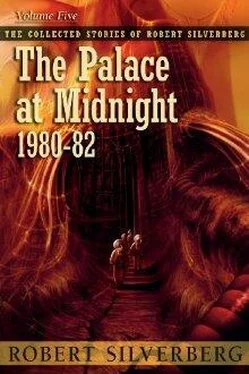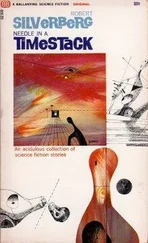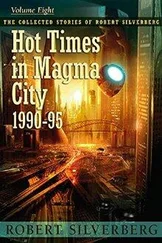Robert Silverberg - The Far Side of the Bell-Shaped Curve
Здесь есть возможность читать онлайн «Robert Silverberg - The Far Side of the Bell-Shaped Curve» весь текст электронной книги совершенно бесплатно (целиком полную версию без сокращений). В некоторых случаях можно слушать аудио, скачать через торрент в формате fb2 и присутствует краткое содержание. Год выпуска: 2013, ISBN: 2013, Издательство: Subterranean Press, Жанр: Фантастика и фэнтези, на английском языке. Описание произведения, (предисловие) а так же отзывы посетителей доступны на портале библиотеки ЛибКат.
- Название:The Far Side of the Bell-Shaped Curve
- Автор:
- Издательство:Subterranean Press
- Жанр:
- Год:2013
- ISBN:978-1-59606-604-5
- Рейтинг книги:4 / 5. Голосов: 1
-
Избранное:Добавить в избранное
- Отзывы:
-
Ваша оценка:
- 80
- 1
- 2
- 3
- 4
- 5
The Far Side of the Bell-Shaped Curve: краткое содержание, описание и аннотация
Предлагаем к чтению аннотацию, описание, краткое содержание или предисловие (зависит от того, что написал сам автор книги «The Far Side of the Bell-Shaped Curve»). Если вы не нашли необходимую информацию о книге — напишите в комментариях, мы постараемся отыскать её.
The Far Side of the Bell-Shaped Curve — читать онлайн бесплатно полную книгу (весь текст) целиком
Ниже представлен текст книги, разбитый по страницам. Система сохранения места последней прочитанной страницы, позволяет с удобством читать онлайн бесплатно книгу «The Far Side of the Bell-Shaped Curve», без необходимости каждый раз заново искать на чём Вы остановились. Поставьте закладку, и сможете в любой момент перейти на страницу, на которой закончили чтение.
Интервал:
Закладка:
The Far Side of the Bell-Shaped Curve
by Robert Silverberg
Sarajevo was lovely on that early summer day. The air sparkled, the breeze off the mountains was strong and pungent, the whitewashed villas glittered in the morning sunlight. Reichenbach, enchanted by the beauty of the place and spurred by a sense of impending excitement, stepped buoyantly out of a dark cobbled alley and made his way in quick virile strides toward the river’s right embankment. It was nearly 10:30.
A crowd of silent, sullen Bosnian burghers lined the embankment. The black-and-gold Hapsburg banners fluttered from every lamppost and balcony. In a little while the archduke Franz Ferdinand, the emperor’s nephew and heir, would come this way with his duchess in their open-topped car. Venturing into dangerous territory, they were, into a province of disaffected and reluctant citizens.
The townsfolk stirred faintly. The townsfolk muttered. Like puddings, Reichenbach thought, they awaited in a dull, dutiful way their future monarch. But he knew they must be seething with revolutionary fervor inside.
Reichenbach looked about him for dark taut youths with the peculiar bright-eyed look of assassins. No one nearby seemed to fit the pattern. He let his gaze wander up the hills to the dense cypress groves, the ancient wooden houses, the old Turkish mosques topped by slender, splendid minarets and back down toward the river to the crowd again. And—
Who is she?
He noticed her for the first time, no more than a dozen meters to his left, in front of the Bank of Austria-Hungary building: a tall auburn-haired woman of striking presence and aura, who in this mob of coarse, rough folk radiated such supreme alertness and force that Reichenbach knew at once she must be of his sort. Yes! He had come here alone, certain he would find an appropriate companion, and that confidence now was affirmed.
He began to move toward her.
His eyes met hers and she nodded and smiled in recognition and acknowledgment.
“Have you just arrived?” Reichenbach asked in German.
She answered in Serbian. “Three days ago.”
Smoothly he shifted languages. “How did I fail to see you?”
“You were looking everywhere else. I saw you at once. You came this morning?”
“Fifteen minutes ago.”
“Does it please you so far?”
“Very much,” he said. “Such a picturesque place. Like a medieval fantasy. Time stands still here.”
Her eyes were mischievous. “Time stands still everywhere,” she said, moving on into English.
Reichenbach smiled. Again he matched her change of language. “I take your meaning. And I think you take mine. This charming architecture, the little river, the ethnic costumes—it’s hard to believe, that a vast and hideous war is going to spring from so quaint a place.”
“A nice irony, yes. And it’s for ironies that we make these journeys, n’est ce pas?”
“Vraiment.”
They were standing quite close now. He felt a current flowing between them, a pulsating, almost tangible force.
“Join me later for a drink?” he said.
“Certainly. I am Ilsabet.”
“Reichenbach.”
He longed to ask her when she had come from. But of course that was taboo.
“Look,” she said. “The archduke and duchess.”
The royal car, inching forward, had reached them. Franz Ferdinand, red-faced and tense in preposterous comic-opera uniform, waved halfheartedly to the bleakly staring crowd. Drab, plump Sophie beside him, absurdly overdressed, forced a smile. They were meaty-looking, florid people, rigid and nervous, all but clinging to each other in their nervousness.
“Now it starts,” he said.
“Yes. The foreplay.” She slipped her arm through his.
Not far away a tall, young, sallow-faced man appeared as if he had sprung from the pavement—wild hyperthyroid eyes, bobbing Adam’s-apple, a sure desperado—and hurled something. It landed just behind the royal car. An odd popping sound—the detonator—and then Reichenbach heard a loud bang. There was a blurt of black smoke and the car behind the archduke’s lurched and crumpled, dumping aides-de-camp into the street. The cortege halted abruptly. The imperial couple, unharmed, sat weirdly upright as if their survival depended on keeping their spines straight. A functionary riding with them said in a clear voice, “A bomb has gone off, your highness.” And Franz Ferdinand, calm, disgusted: “I rather expected something like that. Look after the injured, will you?”
Ilsabet’s hand tightened on Reichenbach’s forearm as the bizarre comedy unfolded: the cars motionless, archduke and duchess still in plain view, the assassin wildly vaulting a parapet and plunging into the shallow river, police pursuing, pouncing, beating him with the flats of their swords, the crowd milling in confusion. At last the damaged car was pushed to the side of the road and the remaining vehicles rapidly drove off.
“End of act one,” Ilsabet said, laughing.
“And forty minutes until act two. That drink, now?”
“I know a sidewalk café near here.”
Under a broad turquoise umbrella Reichenbach had a slivovitz, Ilsabet a mug of dark beer. The stolid citizens at the surrounding tables talked more of hunting and fishing than of the bungled assassination. Reichenbach, pretending to be casual, studied Ilsabet hungrily. A cool, keen intelligence gleamed in her penetrating green eyes. Everything about her was sleek, self-possessed, sure. She was so much like him that he almost feared her, and that was a new feeling for him. What he feared most of all was that he would blunder here at the outset and lose her; but he knew, deep beneath all doubts, that he would not. They were meant for each other. He liked to believe that she came from his moment, and that there would be a chance to continue in realtime, when they had returned from displacement, whatever they began on this jaunt. Of course, one did not speak of such things.
Instead he said, “Where do you go next?”
“The burning of Rome. And you?”
“A drink with Shakespeare at the Mermaid Tavern.”
“How splendid. I never thought of doing that.”
He drew a deep breath and said, “We could do it together,” and hesitated, watching her expression. She did not look displeased. “After we’ve heard Nero play his concerto. Eh?”
She seemed amused. “I like that idea.”
He raised his glass. “Prosit.”
“Zdravlje.”
They snaked wrists, clinked glasses.
For a few minutes more they talked—lightly, playfully. He studied her gestures, her sentence structure, her use of idiom, seeking in the subtlest turns of her style some clue that might tell him that they were co-temporals, but she gave him nothing: a shrewd game player, this one. At length he said, “It’s nearly time for the rest of the show.”
Ilsabet nodded. He scattered some coins on the table and they returned to the embankment, walked up to the Latin Bridge, turned right into Franz Joseph Street. Shortly the royal motorcade, returning from a city-hall reception, came rolling along. There appeared to be some disagreement over the route: chauffeurs and aides-de-camp engaged in a noisy dispute and suddenly the royal car stopped. The chauffeur seemed to be trying to put the car into reverse. There was a clashing of gears. A gaunt boy emerged from a coffeehouse not three meters from the car, less than ten from Reichenbach and Ilsabet. He looked dazed, like a sleepwalker, as if astounded to find himself so close to the imperial heir. This is Gavrilo Princip, Reichenbach thought, the second and true assassin; but he felt little interest in what was about to happen. The gun was out, the boy was taking aim. But Reichenbach watched Ilsabet, more concerned with the quality of her reactions than with the deaths of two trivial people in fancy costumes. Thus he missed seeing the fatal shot through Franz Ferdinand’s pouter-pigeon chest, though he observed Ilsabet’s quick, frosty smile of satisfaction. When he glanced back at the royal car he saw the archduke sitting upright, stunned, tunic and lips stained with red, and the boy firing at the duchess. There was consternation among the aides-de-camp. The car sped away. It was 11:15.
Читать дальшеИнтервал:
Закладка:
Похожие книги на «The Far Side of the Bell-Shaped Curve»
Представляем Вашему вниманию похожие книги на «The Far Side of the Bell-Shaped Curve» списком для выбора. Мы отобрали схожую по названию и смыслу литературу в надежде предоставить читателям больше вариантов отыскать новые, интересные, ещё непрочитанные произведения.
Обсуждение, отзывы о книге «The Far Side of the Bell-Shaped Curve» и просто собственные мнения читателей. Оставьте ваши комментарии, напишите, что Вы думаете о произведении, его смысле или главных героях. Укажите что конкретно понравилось, а что нет, и почему Вы так считаете.












